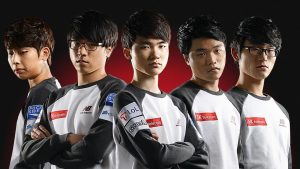League of Legends is a multiplayer online battle arena developed by Riot Games. It attracts millions of fans and players all over the world and creates its own e-sports culture. Faker, a Korean gamer who is famous for his extraordinary skills and performance during matches, is extremely talented and brings his LOL team SKT T1 to the top.

In Kevin Park’s blog post, he discussed the reasons of SKT T1 and Faker’s success as a composition of team work, hard-working spirit, extraordinary management and human resources, and a caring and intelligent coach. While I agree with Kevin’s analysis, I feel that the unique operating system within the team can be further digging into.
League of Legends is a 5 versus 5 game and it requires immediate decision making and group cooperation. Unlike teams from other countries who choose to hire international players with better skills and reputation, all members on SKT T1 are Korean. Despite the elimination of such language barrier, the excellent team work affects a lot. Countries like China offer super high salary to poach staff from SKT T1, especially towards Faker, but most of them choose to stay. These team members stay together, skip holiday, and practice day and night to hold the team together. As what Faker said to ESPN interview: “I think going abroad is a good experience, but personally, I want to stay in Korea and win the world championship again.”1 They love their country and is honored to be a member of SKT T1. The honor of winning the championship is more like an intrinsic motivation as they value glory more than bonus.
The coach kkOma and the management crews are also an important factor on SKT K1’s road to success. There’re specialties who go to every LOL games, search for potential outstanding player and invite them to join the team. They keep inject new ideas and new styles into the team and reinforce it. The coach, as a manager at the workplace, plays a great role on team building. I used to feel that it’s hard to keep SKT K1 united as Faker is far more famous and outstanding than the others. But the coach said that: “It’s a team game. When the team doesn’t do well, Faker doesn’t do well.”2 There’s no bias or hierarchy within the team. Thanks to the structure of the game, each member plays a unique role; there’s no role conflict and the climate of trust is intense.
SKT T1 demonstrates clear purpose, participation, consensus decisions, style diversity and other characteristics of being an effective team3. Together with each member’s great ability of gaming, I believe SKT T1 is going to stay gold and reach the top again.
Word Count: 454
1.& 2.
From The Mag: The Unkillable Demon King. (n.d.). Retrieved March 05, 2017, from
http://www.espn.com/espn/feature/story/_/id/13035450/league-legends-prodigy-faker- carries-country-shoulders
3.
M. Parker, Team Players and Teamwork: The New Competitive Business Strategy (San Francisco: Jossey-Bass, 1990), Table 2, p. 33. Copyright 1990 by Jossey-Bass Inc., Publishers. ISBN: 978-1555422578
